 The independence of the Congo witnessed tensions between different groups which resulted among others to the Katangese secession eleven days after Belgium officially granted the Congo independence. Lubumbashi therefore became the capital of a state whose main goal was to perpetuate western industrialists economic interests and of the Union Minière du Haut Katanga. This history started ± 50 years ago since the assassination of Patrice Lumumba on the 17th of January 1961 up to the time Mzee Kabila took up the power through a statement rebellion movement.
The independence of the Congo witnessed tensions between different groups which resulted among others to the Katangese secession eleven days after Belgium officially granted the Congo independence. Lubumbashi therefore became the capital of a state whose main goal was to perpetuate western industrialists economic interests and of the Union Minière du Haut Katanga. This history started ± 50 years ago since the assassination of Patrice Lumumba on the 17th of January 1961 up to the time Mzee Kabila took up the power through a statement rebellion movement.
I'll visit
14.09.2010 | by association PICHA
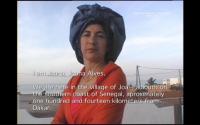 There is something transversal in Ângela Ferreira's video work, something that deals, fundamentally, with a kind of non-correlation between the concrete identity of the filmed places and its investment in open juxtapositions over a constellation of spacial axes and discontinuous temporalities. If territorial duality, inseparable from a certain biographical trajectory, from frequent journeys between Africa - Mozambique and South Africa - and Europe, undoubtedly marks Ângela Ferreira's work, it is precisely this territorial duality that has written history in the indeterminate space of video discourse, pointing to issues of geopolitics and exposing us, simultaneously, to the work of deconstruction of iconography and the colonial and postcolonial imaginary that is being systematically developed by the artist.
There is something transversal in Ângela Ferreira's video work, something that deals, fundamentally, with a kind of non-correlation between the concrete identity of the filmed places and its investment in open juxtapositions over a constellation of spacial axes and discontinuous temporalities. If territorial duality, inseparable from a certain biographical trajectory, from frequent journeys between Africa - Mozambique and South Africa - and Europe, undoubtedly marks Ângela Ferreira's work, it is precisely this territorial duality that has written history in the indeterminate space of video discourse, pointing to issues of geopolitics and exposing us, simultaneously, to the work of deconstruction of iconography and the colonial and postcolonial imaginary that is being systematically developed by the artist.
Afroscreen
13.09.2010 | by Raquel Schefer
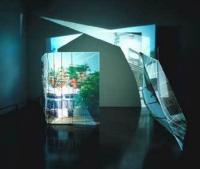 The concept of nationality is not that important to me. I relate very strongly with territories, that is. And I have a strong relationship with Africa, particularly southern Africa, including where I was born, Mozambique, and South Africa, and this Iberian corner of Europe. If I had to define myself culturally in terms of identity, it is somewhere between these two areas of the world that references to my person are found.
The concept of nationality is not that important to me. I relate very strongly with territories, that is. And I have a strong relationship with Africa, particularly southern Africa, including where I was born, Mozambique, and South Africa, and this Iberian corner of Europe. If I had to define myself culturally in terms of identity, it is somewhere between these two areas of the world that references to my person are found.
Face to face
13.09.2010 | by Lúcia Ramos Monteiro
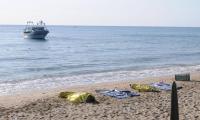 From Melilla to Poland, Cypress to the Canaries, thousands of people daily attempt to leave their places of origin and reach the European continent in search of better living conditions, leaving behind the most varied settings – wars, fires, droughts, floods, repressive regimes, massive unemployment, poverty wages, fundamentalists – and confronting, everywhere, the same repressive strategy, the same barriers and persecution, the same racism and the same violence.
From Melilla to Poland, Cypress to the Canaries, thousands of people daily attempt to leave their places of origin and reach the European continent in search of better living conditions, leaving behind the most varied settings – wars, fires, droughts, floods, repressive regimes, massive unemployment, poverty wages, fundamentalists – and confronting, everywhere, the same repressive strategy, the same barriers and persecution, the same racism and the same violence.
Games Without Borders
09.09.2010 | by Ricardo Noronha
 is craft comes from experience, from much observation, but it’s as if he had been there before. On top of this, he often repeats that there is a cultural sense to making clothes, like a gesture that happens every day but goes back to the very roots of humanity. “It all comes from the divine idea that “Adam sewed leaves and God sewed skins.” Sewing is also cultural. In all families and in all societies we come across those who have this strong cultural element. It’s like learning how to make home-made bread.”
is craft comes from experience, from much observation, but it’s as if he had been there before. On top of this, he often repeats that there is a cultural sense to making clothes, like a gesture that happens every day but goes back to the very roots of humanity. “It all comes from the divine idea that “Adam sewed leaves and God sewed skins.” Sewing is also cultural. In all families and in all societies we come across those who have this strong cultural element. It’s like learning how to make home-made bread.”
Face to face
08.09.2010 | by Marta Lança
 Among us Angolan refugees, especially among the elders, there were those who had a special passion for the Portuguese language. I recall spending holidays at Uncle Jeremias Bandua’s house in Meheba refugee camp. In the day, we would often go to the fields to look after the vegetables etc with older Angolan men. Some of these men were also on holidays as they had scholarships and were attending different college in the urban areas.
Among us Angolan refugees, especially among the elders, there were those who had a special passion for the Portuguese language. I recall spending holidays at Uncle Jeremias Bandua’s house in Meheba refugee camp. In the day, we would often go to the fields to look after the vegetables etc with older Angolan men. Some of these men were also on holidays as they had scholarships and were attending different college in the urban areas.
To read
03.09.2010 | by Sousa Jamba
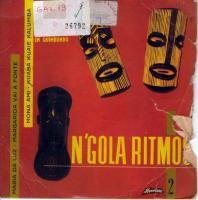 Musseque residents would likely have said, “my suffering, yes, but ours as well.”
Music, in late colonial Angola took private grief and by performing it publicly made it collective. The sound, and perhaps even the process, was attractive to whites as well and in an ironic twist on the lusotropical narrative, by the early 1970s, whites made their way to the musseques in sizeable numbers to hear Ngola Ritmos and other popular bands play.
Musseque residents would likely have said, “my suffering, yes, but ours as well.”
Music, in late colonial Angola took private grief and by performing it publicly made it collective. The sound, and perhaps even the process, was attractive to whites as well and in an ironic twist on the lusotropical narrative, by the early 1970s, whites made their way to the musseques in sizeable numbers to hear Ngola Ritmos and other popular bands play.
Stages
01.09.2010 | by Marissa Moorman
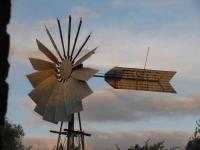 And I believe, having arrived at this point in life, that I can’t stop wanting to understand that the world, all over and not just here, conspires and produces utilizing always, or almost always, the use and abuse of others’ good faith. I’m afraid I will never be able, even oldish, to resign to this and become the subject well done, dissimulated, pirate, adaptable and finally adapted, that never, throughout my entire life, have I managed to be.
And I believe, having arrived at this point in life, that I can’t stop wanting to understand that the world, all over and not just here, conspires and produces utilizing always, or almost always, the use and abuse of others’ good faith. I’m afraid I will never be able, even oldish, to resign to this and become the subject well done, dissimulated, pirate, adaptable and finally adapted, that never, throughout my entire life, have I managed to be.
Ruy Duarte de Carvalho
31.08.2010 | by Ruy Duarte de Carvalho
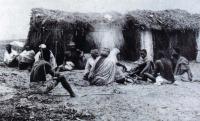 Can you imagine the Portuguese language at the centre of a learning-at-play exercise in the heart of Angola, where the main character, the protagonist, has no kind of academic training? It’s possible. In fact, in a tale told by the writer Uanhenga Xitu, it happens.
Can you imagine the Portuguese language at the centre of a learning-at-play exercise in the heart of Angola, where the main character, the protagonist, has no kind of academic training? It’s possible. In fact, in a tale told by the writer Uanhenga Xitu, it happens.
Face to face
18.08.2010 | by Luis Kandjimbo
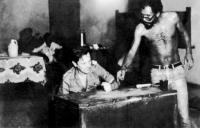 Angola is a leading oil producer in Africa and one
might have expected that some of the financial
benefits of this valuable commodity would be passed onto the country’s film industry. Veteran Angolan filmmaker Mariano Bartolomeu provides an insight into the state of the film and television
industry in this Portuguese speaking country.
Angola is a leading oil producer in Africa and one
might have expected that some of the financial
benefits of this valuable commodity would be passed onto the country’s film industry. Veteran Angolan filmmaker Mariano Bartolomeu provides an insight into the state of the film and television
industry in this Portuguese speaking country.
Afroscreen
14.08.2010 | by Martin Chemhere
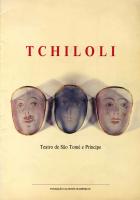 Tchiloli is a story of blood and justice that the local people have made their own. They have turned it into a way to raise their voices against opression but also to retie their links with their African ancestors. Behind the colourful spectacle there is a hidden invocation to their ancestors, in references to a cult that was forbidden under colonial rule. Defeat comes, but there emerges an identity in territory that the first players could take for their own as a means of survival.
Tchiloli is a story of blood and justice that the local people have made their own. They have turned it into a way to raise their voices against opression but also to retie their links with their African ancestors. Behind the colourful spectacle there is a hidden invocation to their ancestors, in references to a cult that was forbidden under colonial rule. Defeat comes, but there emerges an identity in territory that the first players could take for their own as a means of survival.
Stages
12.08.2010 | by Agnela Barros
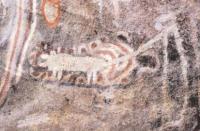 One of the most important archeological sites in southwest Angola, Tchitundo-hulo, lies in a semi-arid region on the edge of the Namib desert. The site comprises an imposing granite inselberg, with three smaller hills nearby. These smaller inselbergs are known as Tchitundo-hulo Mucai, Pedra da Lagoa (Lake Rock), and Pedra das Zebras (Zebra Rock). The inselbergs all feature carvings engraved upon the rockface.
One of the most important archeological sites in southwest Angola, Tchitundo-hulo, lies in a semi-arid region on the edge of the Namib desert. The site comprises an imposing granite inselberg, with three smaller hills nearby. These smaller inselbergs are known as Tchitundo-hulo Mucai, Pedra da Lagoa (Lake Rock), and Pedra das Zebras (Zebra Rock). The inselbergs all feature carvings engraved upon the rockface.
I'll visit
09.08.2010 | by Dario Melo
 Living with Raul is like watching a non-stop show. Gestures, speech patterns, facial expressions, his (…) air, he’s a boy on stage all the time. There’s never any shortage of stories when he is around. His charm never lets go of you. In true Angolan fashion, everything came together – the excitement for life, the wide range of views, his instinct for theatre, and the smile instead of the tear. It all converged to create the talent that is Raul Rosário.
Living with Raul is like watching a non-stop show. Gestures, speech patterns, facial expressions, his (…) air, he’s a boy on stage all the time. There’s never any shortage of stories when he is around. His charm never lets go of you. In true Angolan fashion, everything came together – the excitement for life, the wide range of views, his instinct for theatre, and the smile instead of the tear. It all converged to create the talent that is Raul Rosário.
Face to face
31.07.2010 | by Marta Lança
 This Angolan poet and musician has captivated European audiences, but the journey has been long and hard. In Lisbon, he was able to show us the rich cultural heritage of sounds emerging from Africa which had hitherto been hidden. He drew on his experience and on sounds from Angola and meshed them with the latest sounds being played in Europe. His music speaks of new trends and of being a global citizen. These are some of the secrets behind his original sound.
This Angolan poet and musician has captivated European audiences, but the journey has been long and hard. In Lisbon, he was able to show us the rich cultural heritage of sounds emerging from Africa which had hitherto been hidden. He drew on his experience and on sounds from Angola and meshed them with the latest sounds being played in Europe. His music speaks of new trends and of being a global citizen. These are some of the secrets behind his original sound.
Face to face
22.07.2010 | by Marta Lança
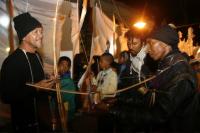 ...I am skeptical of claims made on behalf of populations, particularly in culturally disenfranchised and economically impoverished locations such as New Orleans or Haiti. I also do think that there can be legitimate concerns about the neo-colonial nature of the worldwide biennial trend, which tends to impose a Western cultural model as mainstream in non-Western locales the artistic practices and cultural heritage of which often belie the notion that contemporary art is a globally shared cultural value.
...I am skeptical of claims made on behalf of populations, particularly in culturally disenfranchised and economically impoverished locations such as New Orleans or Haiti. I also do think that there can be legitimate concerns about the neo-colonial nature of the worldwide biennial trend, which tends to impose a Western cultural model as mainstream in non-Western locales the artistic practices and cultural heritage of which often belie the notion that contemporary art is a globally shared cultural value.
Face to face
22.07.2010 | by Claire Tancons
 Real recognition for her talent came in 1966, when she wins the performance award at the Luanda song contest, with the famous song “Maria Provocação” by Ana Maria de Mascarenhas and Adelino Tavares da Silva. She still has vivid memories: “That night, in September 1966, in the Aviz cinema, there was only typically Angolan music to be heard. It was an overwhelming success and the sadness was also overwhelming when they announced that “Maria Provocação” could not be entered, because the organisers wouldn’t authorise the typical Angolan instruments of Ngola Ritmos to be part of the orchestra.
Real recognition for her talent came in 1966, when she wins the performance award at the Luanda song contest, with the famous song “Maria Provocação” by Ana Maria de Mascarenhas and Adelino Tavares da Silva. She still has vivid memories: “That night, in September 1966, in the Aviz cinema, there was only typically Angolan music to be heard. It was an overwhelming success and the sadness was also overwhelming when they announced that “Maria Provocação” could not be entered, because the organisers wouldn’t authorise the typical Angolan instruments of Ngola Ritmos to be part of the orchestra.
Stages
18.07.2010 | by Mário Rui Silva
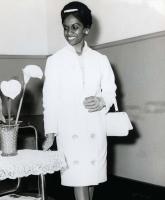 Her compositions were first known only in a small inner circle, but with the Luanda Song Festival, her work became known to a wider public. In the 60s she had formed a duo with the Portuguese journalist Adelino Tavares da Silva, who had just arrived in Angola. They composed four or five songs together and then registered in the Portuguese Writers’ Association, with Adelino as songwriter and Ana Maria as composer. It can be said that the duo revolutionised the Song Festival, when Maria Provocação was performed by Sara Chaves and Mulata é a Noite by Concha de Mascarenhas. They were both accompanied by Ngola Ritmos, the Angolan rhythm group.
Her compositions were first known only in a small inner circle, but with the Luanda Song Festival, her work became known to a wider public. In the 60s she had formed a duo with the Portuguese journalist Adelino Tavares da Silva, who had just arrived in Angola. They composed four or five songs together and then registered in the Portuguese Writers’ Association, with Adelino as songwriter and Ana Maria as composer. It can be said that the duo revolutionised the Song Festival, when Maria Provocação was performed by Sara Chaves and Mulata é a Noite by Concha de Mascarenhas. They were both accompanied by Ngola Ritmos, the Angolan rhythm group.
Stages
08.07.2010 | by Mário Rui Silva
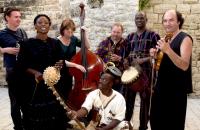 Congo sends their hottest stars, but Mali is the African country with more representatives in FMM Sines 2010: Tinariwen, Cheick Tidiane Seck feat. Mamani Keita and Founé Diarra Trio (along with Breton Jacky Molard Quartet).
Congo sends their hottest stars, but Mali is the African country with more representatives in FMM Sines 2010: Tinariwen, Cheick Tidiane Seck feat. Mamani Keita and Founé Diarra Trio (along with Breton Jacky Molard Quartet).
Stages
08.07.2010 | by Câmara Municipal de Sines
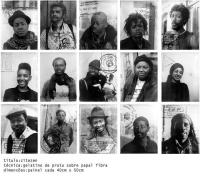 Délio Jasse work can be interpreted under the somewhat complex view of the post colonial speeches, in the sense that his images emanate a quality of alterity, which gives them identity. However this simplification can be limiting if it becomes dissonant with the artistic speech where his images belong, obviously.
Délio Jasse work can be interpreted under the somewhat complex view of the post colonial speeches, in the sense that his images emanate a quality of alterity, which gives them identity. However this simplification can be limiting if it becomes dissonant with the artistic speech where his images belong, obviously.
Face to face
08.07.2010 | by Hugo Dinis
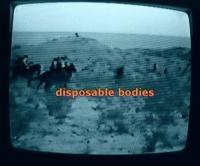 I have decided to act in the symbolic realm. The aim is not to change the world out there but the discourse about the world out there. To sharpen the consciousness about ones proper accountability for global developments. In my artistic and textual work, I try to elaborate on the correlation between high-technologized societies and the production of precarious living conditions. One of my prime concerns is the willingness to recognize that causes and solutions are not always located somewhere on the “outside”.
I have decided to act in the symbolic realm. The aim is not to change the world out there but the discourse about the world out there. To sharpen the consciousness about ones proper accountability for global developments. In my artistic and textual work, I try to elaborate on the correlation between high-technologized societies and the production of precarious living conditions. One of my prime concerns is the willingness to recognize that causes and solutions are not always located somewhere on the “outside”.
To read
27.06.2010 | by Ursula Biemann